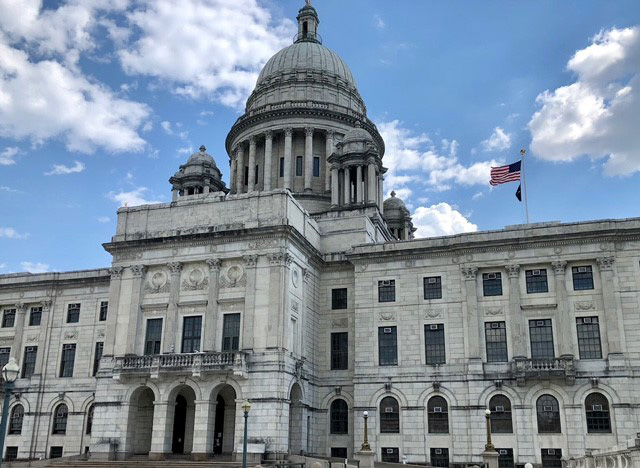Rhode Island’s adoption of a “Homeless Bill of Rights” may have won state leaders praise when it was passed in 2012, but the weakness of the law was exposed when an encampment of people without homes was removed from Statehouse grounds last month, advocates for the unhoused say.
The homeless bill of rights was seen as groundbreaking a decade ago when many communities nationwide prohibited actions such as loitering and panhandling. Instead, the Rhode Island law – the first of its kind in the U.S. – offered unhoused people the protections of privacy, use and movement in public spaces, and equal treatment from public agencies.
The law also says people whose rights have been violated can “seek remedies ranging from injunctive relief to monetary damages.”
While local advocates still praise the law, some maintain that it was violated when Gov. Daniel J. McKee’s administration issued an order to have the tents taken down in December. In response, a team of civil rights attorneys and the American Civil Liberties Union of Rhode Island Inc. filed a lawsuit to stop it.
R.I. Superior Court Judge R. David Cruise sided with McKee, and the encampment was removed on Dec. 18.
In the lawsuit, the plaintiffs noted that the Statehouse was chosen as an act of protest “because [the people in the encampment] wish to convey a message that they are in need of and unable to access adequate shelter and they believe that the message is best conveyed by their continuing physical presence at the seat of Rhode Island government.”
But the McKee administration asserted that the people staying at the Statehouse had created “unsafe and unhealthy conditions,” and cited a rule governing the regulation of events on Statehouse grounds.
McKee says he’s taken action to address the homeless problem, including allocating $6 million to increase shelter capacity and $1.6 million in outreach initiatives to connect the homeless population to services. The Cranston Street Armory in Providence also opened as a 24-hour warming station on Dec. 15.
“The administration is continuing to do the work to connect unhoused Rhode Islanders … with a warm place to stay,” McKee said.
The number of unsheltered increased by 37% in 2022. There are about 1,400 homeless in Rhode Island, according to figures compiled by the Rhode Island Center for Justice and the Rhode Island Coalition to End Homelessness. The waiting list for a shelter bed is in the hundreds, said Jennifer Wood, executive director of the Center for Justice.
As the population of the unhoused rises, the question of civil rights – including the right to protest – becomes crucial, advocates say.
Margaux Morisseau, deputy director of the Coalition to End Homelessness, says the encampment removal was “a clear violation of the homeless bill of rights” and “a clear violation of the right to protest.”
Lynette Labinger, a cooperating attorney with the ACLU, says the bill of rights law needs to be strengthened. “There are a lot of lofty ideals, but we did not receive any protections for our case,” she said.
Labinger says the McKee administration’s citation of an event planning regulation was especially troublesome. “It had nothing to do with that,” she said, calling the judge’s ruling “chilling.”
“The government was uncomfortable with having people at the Statehouse during Christmas season,” she said. “They made people uncomfortable in a way that [other protests] do not. You bring that point home to the decision makers and look at what happens.”












If you mean abolished, then the answer is “YES!”